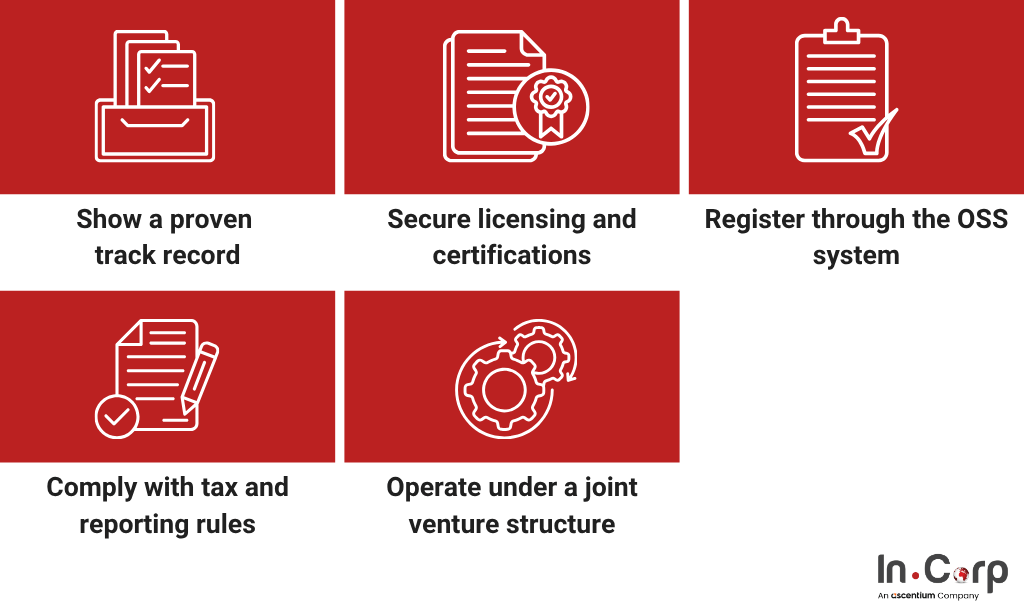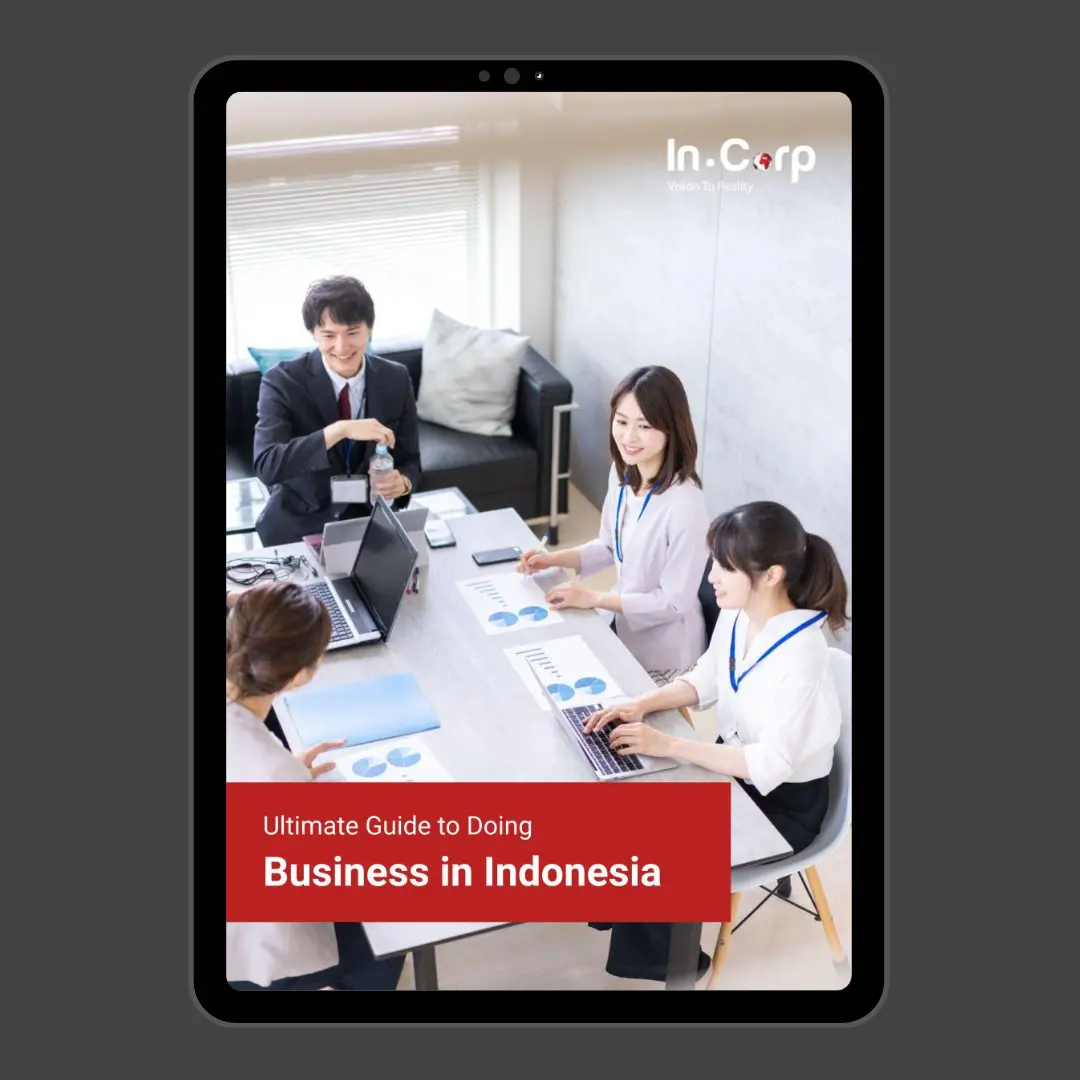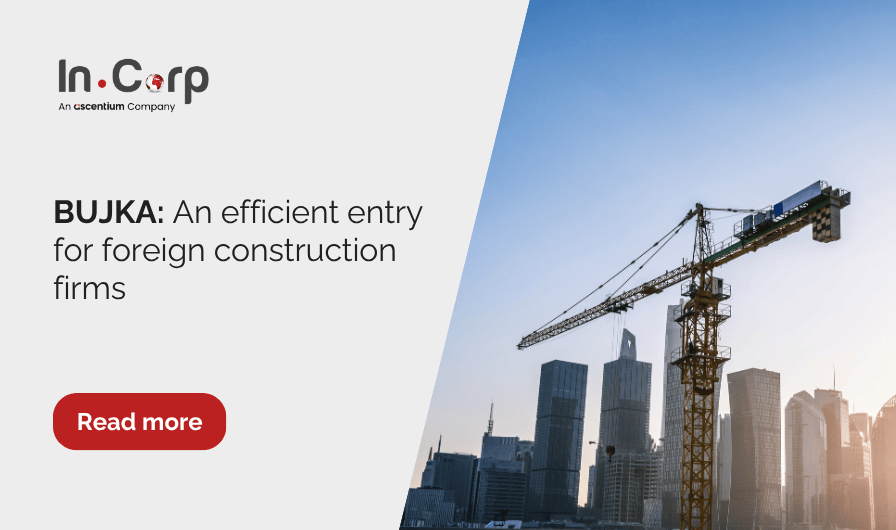BUJKA (Badan Usaha Jasa Konstruksi Asing) offers a faster, lower-risk way for foreign construction companies to access large-scale projects in Indonesia. It allows them to operate legally without forming a complete local entity.
BUJKA provides a structured pathway to enter the market and participate in high-value construction projects through joint operations with regional partners.
This guide will cover how BUJKA works, its requirements, and why it’s a practical entry point into Indonesia’s growing construction sector.
Indonesia’s construction market outlook
Indonesia’s construction sector is transforming due to infrastructure expansion and urban development. In 2024, it was valued at about USD 273.15 billion, accounting for nearly 10% of GDP. The market is expected to grow to USD 312.84 billion in 2025 and USD 535.98 billion by 2030, with a compound annual growth rate (CAGR) of 11.4%. Key growth drivers include:
- Public-private infrastructure projects: Indonesia aims to raise infrastructure investments to USD 430 billion by 2025.
- Urbanization and housing demand: A rapidly growing middle class is fueling demand for residential and commercial construction.
- Energy and transportation: Ongoing projects include toll roads, railways, ports, and renewable energy infrastructure.
This fast-growing market presents significant opportunities, but only for companies that can navigate the regulatory landscape efficiently.
Read more: Foreign direct investment in Indonesia gains confidence
Entry barriers for foreign construction firms into Indonesia
Despite the strong growth of Indonesia’s construction sector, foreign companies may face considerable legal and operational obstacles that complicate market entry. These are:
- Legal restrictions: Must register under an approved entity; most major projects require local licensing.
- Capital requirements: PT PMA setup requires IDR 2.5 billion in paid-up capital and IDR 10 billion in total investment.
- Complex licensing: Certifications like SBU, SKA, and KTA require local compliance and are time-consuming.
- Limited autonomy: Some projects still require partnerships with 100% Indonesian-owned firms.
- Slow setup: Legal formation and licensing can take several months, which is too slow for urgent or short-term projects.
Understanding BUJKA in Indonesia for foreign structure companies
BUJKA is a licensed representative office that allows foreign construction companies to operate legally in Indonesia without establishing a full local company. It offers a structured pathway to enter the market and participate in high-value construction projects through a joint operation with a 100% Indonesian-owned partner.
Key benefits of BUJKA
- No local shareholding required: The foreign company retains full ownership of its operations.
- Faster and lower-cost setup: Less capital and time required than forming a PT PMA.
- Access to major projects: BUJKA is tailored for complex, large-scale, or high-risk construction work.
- Joint operation model (KSO): Project execution is done in partnership with a fully Indonesian-owned construction company.
- Full legal compliance: BUJKA is recognized under Indonesian construction and investment laws.
For foreign firms looking to enter the Indonesian market quickly and legally, BUJKA is a practical and viable alternative to setting up a full subsidiary.
Who should consider using BUJKA?
BUJKA is tailored for specific business profiles and project types. It’s not ideal for every foreign firm, but it can be a highly effective entry route under the right conditions.
When BUJKA is the right choice
- For established foreign construction firms with experience in large-scale or high-risk projects
- When pursuing project-based or short-term contracts in Indonesia
- To test the market before committing to a full investment via a PT PMA
- For firms offering specialized technical expertise not readily available locally
When BUJKA may not be suitable
- If planning long-term, multi-sector operations across Indonesia
- For companies that want complete control without a local partner
- When targeting small-scale or routine projects, which are typically reserved for local firms
If your firm needs a flexible, compliant way to access Indonesia’s construction sector without the burden of complete company formation, BUJKA offers the right fit.
How BUJKA compares to PT PMA
Foreign construction companies looking to enter the Indonesian market typically choose between two legal structures: BUJKA or a PT PMA (a foreign-owned limited liability company). Each has distinct advantages and limitations depending on your business goals.
BUJKA is ideal for quick market access and strategic partnerships, while PT PMA offers more autonomy and long-term scalability, but requires a greater investment of time and capital. Understanding these differences is essential for choosing your market entry strategy.
| Feature | BUJKA | PT PMA |
| Ownership | 100% foreign-owned | Foreign-owned with a local entity |
| Entity Type | Representative office | Full legal company |
| Capital Requirement | No fixed capital | IDR 2.5B paid-up / IDR 10B total |
| Execution Model | Joint operation with a local partner | Can operate independently |
| Best For | Short-term or large-scale projects | Long-term, fully controlled setup |
BUJKA is ideal for quick market access and strategic partnerships, while PT PMA offers more autonomy and long-term scalability, but requires a greater investment of time and capital. Understanding these differences is essential for choosing your market entry strategy.
How BUJKA operates under a joint operation model
Foreign construction companies operating under a BUJKA license must work through a joint operation called Kerja Sama Operasi (KSO). This model ensures compliance with Indonesian regulations while leveraging foreign expertise on local projects.
It involves partnering with a 100% Indonesian-owned construction company, sharing roles and liabilities, and registering each project separately with the Ministry of Public Works and Housing.
- Local partner required: BUJKA must partner with a 100% Indonesian-owned construction company. The local partner holds key operational licenses and shares responsibility for project execution.
- Shared roles and liabilities: The joint operation agreement defines how work, profits, and risks are shared between the foreign and local entities.
- One-time project registration: Each BUJKA project must be registered separately with the Ministry of Public Works and Housing.
- No independent execution: BUJKA cannot execute projects independently; it participates only through a registered joint operation.
How to set up and operate a BUJKA in Indonesia

Setting up a BUJKA is faster than forming a PT PMA, but it still requires careful legal compliance. From registration to ongoing operations, foreign construction firms must meet specific requirements under Indonesian law, such as:
- Eligibility: Your company must have a track record in large-scale or technically complex construction.
- Licensing: The entity must hold certifications such as the SBU, SKA, and KTA, and appoint a chief representative in Indonesia.
- Registration: All applications go through Indonesia’s OSS system, and each project must be registered individually.
- Tax & reporting: The representative offices must obtain an NPWP (tax number) and comply with local tax and operational reporting rules.
- Operational limits: The entity cannot operate independently and must be a joint venture with a 100% Indonesian-owned partner.
Complying with these rules can lead to project delays, license revocation, or fines. That’s why many firms choose to work with an experienced advisor.
Guide to Doing Business in Jakarta

Effortless BUJKA setup with InCorp
BUJKA is the most efficient legal entry strategy for project-specific work, market testing, or large-scale construction ventures. InCorp Indonesia (an Ascentium Company) can help you incorporate your foreign construction companies and confidently navigate Indonesia’s complex legal system.
Our services include:
- Full BUJKA setup and documentation
- Legal compliance and licensing support
- Ongoing reporting and regulatory updates
Complete the form below to operate legally and efficiently, without the stress of navigating local bureaucracy.
Get in touch with us.
What you'll get
A prompt response to your inquiry
Knowledge for doing business from local experts
Ongoing support for your business
Disclaimer
The information is provided by PT. Cekindo Business International (“InCorp Indonesia/ we”) for general purpose only and we make no representations or warranties of any kind.
We do not act as an authorized government or non-government provider for official documents and services, which is issued by the Government of the Republic of Indonesia or its appointed officials. We do not promote any official government document or services of the Government of the Republic of Indonesia, including but not limited to, business identifiers, health and welfare assistance programs and benefits, unclaimed tax rebate, electronic travel visa and authorization, passports in this website.



